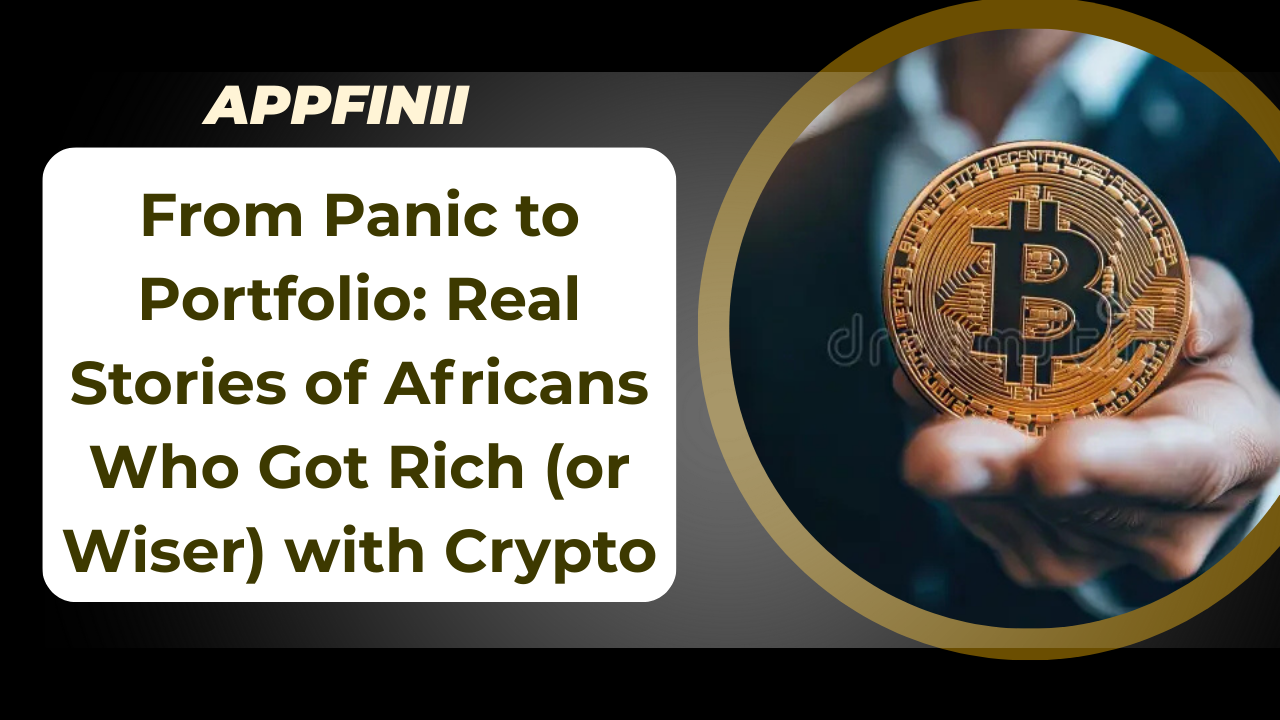The world of cryptocurrency is often painted with two brushes: dreams of sudden wealth and nightmares of financial ruin. Nowhere is this duality more visible than in Africa, where economic uncertainty, weak local currencies, and limited banking access have pushed many into crypto—either out of desperation or curiosity.
But within that chaos, a quieter story is unfolding: a story of real Africans who moved from panic to strategy, and from fear to financial literacy. In this post, we’ll explore real-life examples of Africans who either built wealth or gained hard-earned wisdom through crypto.
The African Crypto Landscape: Why Panic Turned into Participation
Before diving into personal stories, it’s important to understand the backdrop.
Africa is one of the fastest-growing regions for cryptocurrency adoption. According to Chainalysis (2023), countries like Nigeria, Kenya, Ghana, and South Africa are among the global leaders in peer-to-peer crypto usage, not just for speculation, but for remittances, savings, and business transactions.
Several factors contribute to this:
- Currency depreciation (e.g., the Nigerian Naira or Zimbabwean Dollar)
- Capital controls (restrictions on moving money internationally)
- Limited access to traditional financial services
- High youth population with mobile-first internet access
Story 1: Chinedu from Lagos – “Bitcoin Paid for My UK Visa”
Chinedu, a 29-year-old web developer from Lagos, had been freelancing online since 2018. But by 2020, the pandemic hit hard, and many of his international clients started paying him in Bitcoin through platforms like Bitwage and Binance P2P.
At first, he was skeptical. “I didn’t understand it fully, but I needed to get paid,” he says.
Over time, Chinedu realized that holding onto some Bitcoin instead of immediately converting it to Naira protected him from inflation. In fact, between 2020 and 2021, Bitcoin’s price more than tripled, and that helped him save enough for his visa application, flights, and first rent payment when he relocated to the UK for postgraduate studies.
📌 Lesson: Crypto, when used wisely, can act as a shield against currency volatility and even fund long-term goals.
Story 2: Aisha from Kano – “Scammed but Smarter”
Not every story ends in riches—but some end in wisdom.
Aisha, a 33-year-old teacher, was introduced to cryptocurrency by a friend who pitched an “investment club.” She deposited ₦500,000 into a so-called staking platform that promised 30% monthly returns.
Within 3 months, the site vanished. No customer support. No refunds.
At first, she felt ashamed. “I didn’t tell my husband for months,” she said. But instead of walking away from crypto altogether, she began researching. Today, Aisha is a vocal educator on Twitter and WhatsApp groups, warning others against scams and promoting safer platforms like Luno, Binance, and Trust Wallet.
She now uses stablecoins like USDT to save money and send cash to her siblings in Sudan with lower fees than Western Union.
📌 Lesson: Even when crypto leads to losses, the experience can create smarter users and stronger communities.
Story 3: Bhekizizwe from Johannesburg – “From Township Hustler to NFT Artist”
Raised in Soweto, Bhekizizwe had always loved art, but galleries were out of reach. In 2021, he stumbled upon NFTs (Non-Fungible Tokens) via Twitter. Using a borrowed laptop and free Wi-Fi from a library, he listed his first digital artwork on OpenSea.
It didn’t sell. But he kept learning.
After joining an NFT collective focused on African creators, he sold an animated digital painting for 0.5 ETH (~$1,500 at the time). “It was more than I had made in months,” he said.
Since then, he’s been featured in online exhibitions and mentored others from disadvantaged communities, using crypto not just as money—but as access to global markets.
📌 Lesson: Crypto is opening up entirely new career paths for creatives and freelancers.
Story 4: Grace from Nairobi – “I Built a Business on Stablecoins”
When Kenya’s currency (KES) started experiencing inflation in 2022, Grace, a small business owner, began accepting USDT and BUSD stablecoins from her foreign suppliers and clients.
She used Binance Pay to invoice clients and converted only what she needed weekly into Kenyan Shillings, thereby protecting most of her business revenue from inflation.
With time, she started teaching other entrepreneurs how to use blockchain for business operations, from payments to customer reward tokens.
📌 Lesson: Stablecoins can be the bridge between traditional business and digital finance, especially in unstable economies.
Story 5: Samuel from Accra – “Crypto Gave Me a Second Chance”
Samuel had served 8 years in prison for a non-violent offense. When he got out in 2020, no one would hire him. A friend introduced him to cryptocurrency trading via YouTube tutorials.
He started small—just $20 in capital—and focused on arbitrage trading between Binance P2P and local exchanges.
Now, he teaches others through Telegram classes and has helped over 100 people in his community learn about legit crypto use cases, staying away from “get-rich-quick” platforms.
📌 Lesson: Crypto offers a second chance and dignified digital work opportunities to people shut out of traditional systems.
Common Themes in These Stories
Despite their differences, the stories above reveal common threads:
- Necessity drives adoption. Most people didn’t enter crypto for fun—they entered out of economic urgency.
- Education is the best investment. The people who succeeded long-term took time to learn.
- Crypto is not one-size-fits-all. Some used it for saving, others for business, and some for art or remittances.
- Resilience is key. Even those who lost money early found ways to bounce back smarter.
Takeaway for Readers
You don’t have to be a tech expert or millionaire to benefit from crypto. But you do need:
✅ Patience – Avoid rushing into investments because of hype.
✅ Practical use – Use crypto for real-world goals: savings, business, education.
✅ Protection – Learn about scams, use strong wallets, and follow trusted communities.
✅ Perspective – Whether you gain money or wisdom, both are valuable.
Final Thoughts: Your Panic Could Be Your Beginning
In Africa, where traditional systems often fail, crypto is not just a tool—it’s a lifeline, a classroom, and a second chance.
These stories are not hype—they’re real lives reshaped by technology. And if you approach it with caution, knowledge, and clear intention, your own journey from panic to portfolio might just be beginning.




